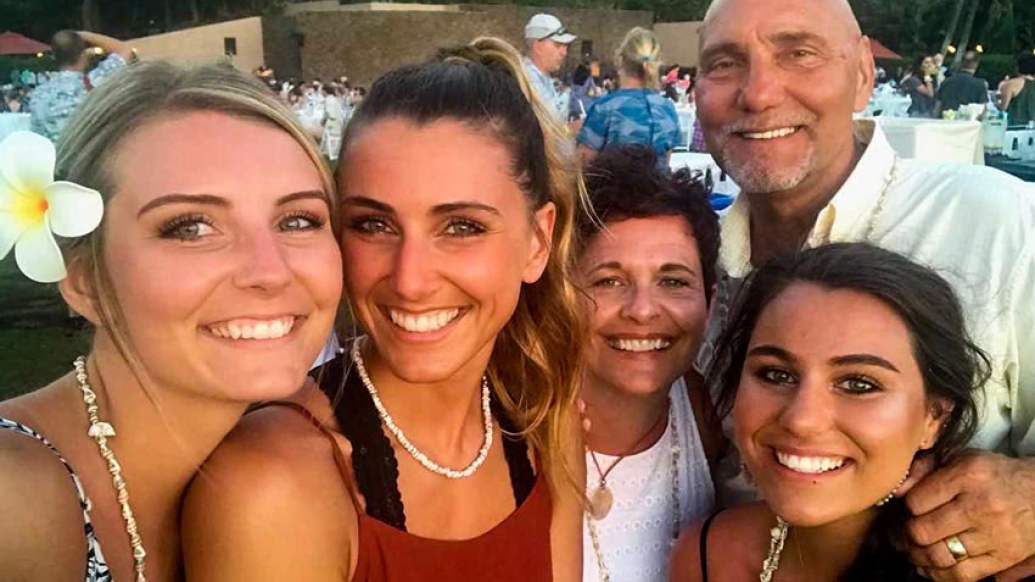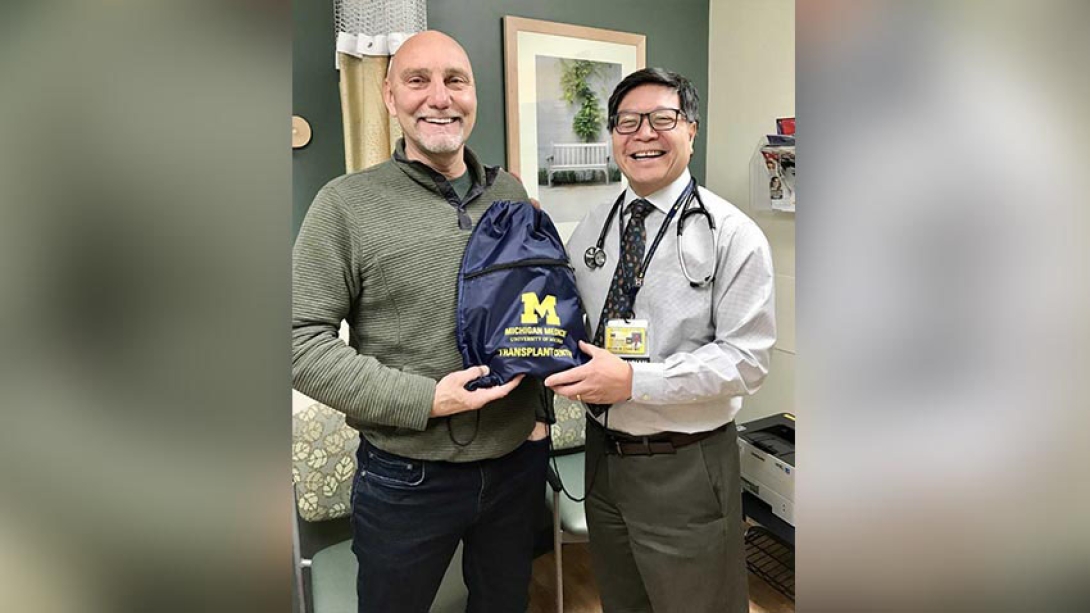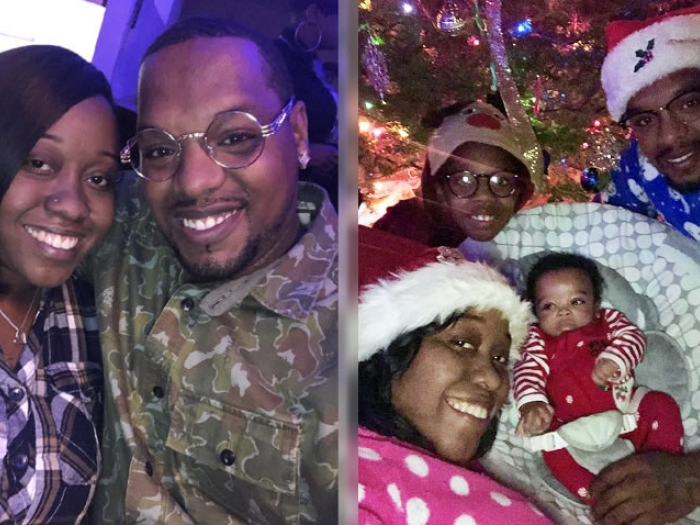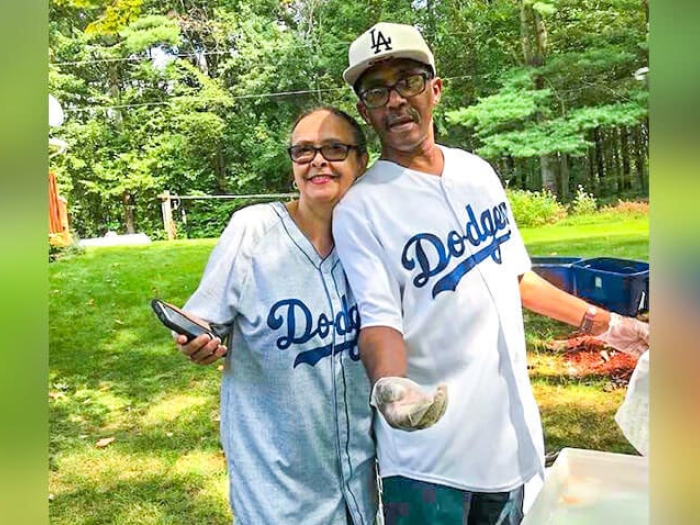The coronavirus hit almost an entire family, including a double lung transplant recipient and father of three who was one of the first cases in Michigan. He recounts his experience.
12:30 PM
Author |

Editor's note: Information on the COVID-19 crisis is constantly changing. For the latest numbers and updates, keep checking the CDC's website. For the most up-to-date information from Michigan Medicine, visit the hospital's Coronavirus (COVID-19) webpage.
Interested in a COVID-19 clinical trial? Health research is critical to ending the COVID-19 pandemic. Our researchers are hard at work to find vaccines and other ways to potentially prevent and treat the disease and need your help. Sign up to be considered for a clinical trial at Michigan Medicine.
What started out as a slight fever, headache and cough in March didn't initially worry Paul DeWyse, 57, who is a double lung transplant recipient.
"When you have lungs like mine, it's normal to have a cough. I didn't think anything of it," says DeWyse. He brushed it off as a cold. But in three hours, the cough became deeper and the headache got worse.
That same day, the body aches took a toll and over the counter pain relief wasn't cutting it. He developed gastrointestinal symptoms and felt sick to his stomach. When he started vomiting, the Livonia resident assumed he had the flu and went straight to Michigan Medicine's emergency room.
DeWyse, his wife and three daughters hadn't discussed the coronavirus, and never expected it to start sweeping across the U.S. as it did a few weeks later. "When I was feeling sick, there were still so few people that had the virus. All I had really known about it was what I heard on the news about how it was affecting China," he says.
Hospital staff and DeWyse were puzzled when his flu test came back negative. He insisted something was wrong because his symptoms felt like flu, but "ten times worse."
So DeWyse had a second test, this time for COVID-19. Twenty-four hours later, the results were in.
Positive.
MORE FROM MICHIGAN: Sign up for our weekly newsletter
Having a positive diagnosis
DeWyse, who says he received a new chance at life after his lung transplant at Michigan Medicine in 2018, was stunned. He burst into tears.
Being immunocompromised and in his 50s, he thought this was it.
"My wife had already been through so much with me," he says. "No one in my family could fathom that this diagnosis was real."
Now, placed in an isolation room as Michigan Medicine's first COVID-19 patient, DeWyse would be quarantined from his family. Although he was used to being hospitalized, the social isolation made for a unique inpatient experience.
On March 10, the day after he was diagnosed, Michigan Governor Gretchen Whitmer reported the state's two first COVID-19 cases and declared a state of emergency. DeWyse started to hear himself referred to as a "Wayne County man with a history of domestic travel" in media reports.
"After that, my life felt like a movie," says DeWyse. "Reporters were talking about me but didn't know who I was."
Soon, leaked information about his neighborhood and workplace found its way to the press and became public. "I felt guilty," he says. "I didn't want to subject my family or coworkers to the possibility of reporters showing up at my home or office."
DeWyse's coworkers, as well as certain family, friends and neighbors who had been in contact with him, were notified of his diagnosis. "As you can imagine, news like that would travel very quick."
10 days in quarantine
Dennis Lyu, M.D., the attending inpatient physician for lung transplant services, oversaw DeWyse's care nine of the 10 days he was hospitalized. After visiting and examining him in the room, Lyu would go back and FaceTime DeWyse later each day, so he could spend more time talking to his patient and see how he was holding up.
"We wanted to make sure we did everything we could to provide him with the best care and also protect our providers and staff," Lyu says.

The treatment included different antibiotics delivered intravenously and pain killers for the body aches. To DeWyse's surprise, he didn't have any shortness of breath. He never needed a ventilator.
"I've always been active, but especially so after my double lung transplant. I wanted to take care of my new, healthy lungs. Before the gyms closed, I went every single day," he says. "Maybe that's why I didn't have the lung issues." Lyu confirmed DeWyse's health and active lifestyle could've contributed to his lack of respiratory symptoms.
Unfortunately, the body aches would come and go throughout his hospital stay, and they were brutal. To get through the harder days, DeWyse would try and sleep it away. On day 10, symptoms had lightened enough that his care team determined he could finish recovering at home.
After getting discharged, Lyu continued to FaceTime DeWyse every few days to see how he was feeling and was delighted to find he made a full recovery.
"We weren't sure how the virus would affect him because of his status as a lung transplant recipient and there was definitely a learning curve since he was our first lung transplant patient with the coronavirus," Lyu says.
LISTEN UP: Add the new Michigan Medicine News Break to your Alexa-enabled device, or subscribe to our daily updates on iTunes, Google Play and Stitcher.
Life after discharge
Despite DeWyse feeling back to normal, new challenges were around the corner. His daughter Megan, 23, developed a headache, runny nose and sneeze. Although atypical symptoms, she too tested positive for COVID-19. Soon after, another daughter, Molly, 20, tested positive after developing a headache and cough. Neither of the girls had vomiting, diarrhea or body aches. However, both had lost their sense of taste and smell.
"This was before loss of taste and smell were publicized as common symptoms so it made the situation even more distressing," DeWyse says. Luckily, both daughters were able to self-quarantine and make a full recovery.
Just as DeWyse's family thought they were out of the woods, his wife Marci got sick for several days with a terrible headache, chills, aches and painful deep breaths. A test confirmed she had also contracted the virus and it took two weeks to recover.
"Having the whole family down with the virus was a major challenge. We didn't know who to be quarantined from at what time," he says. "Once I got better, the girls and I helped take care of Marci because we were all doing OK."
He adds that their house would be viewed as "the house" with the virus. "We kept thinking it would never be normal again. No one would want to hang out with us for a long time. Family and friends were awesome though, frequently leaving food and supplies on our porch."
Reflecting
"There were advantages and disadvantages to being the first patient," DeWyse says. "I still have questions I don't have answers to, like if I'm immune now or if this will come back in a cyclical way, like the flu. On the other hand, I'm so grateful for all the individualized care and attention I got. My outcome could've been different without it."
He could have contracted the virus anywhere: he visited the hospital often for checkups, went to the gym every day, traveled because of his job, just returning from Texas and Washington D.C. He could have touched an infected cart at the grocery store. "I was so careful in everything I did. I always wore masks or gloves when I went places," he says. "But you can't be careful enough."
Looking to the future, DeWyse says there's one thing he's ecstatic to be able to do – walk his daughters down the aisle.
"When I had my double lung transplant back in 2018, I could barely walk 15 feet without having to take a rest. The dream of walking my girls down the aisle one day was out of reach. After I got COVID-19, I had that same dread. But let me tell you, I'm a cat with nine lives and I'm going to walk my girls down the aisle. I'll walk my girls down the aisle one day, and that means absolutely everything to me."

Explore a variety of healthcare news & stories by visiting the Health Lab home page for more articles.

Department of Communication at Michigan Medicine
Want top health & research news weekly? Sign up for Health Lab’s newsletters today!





